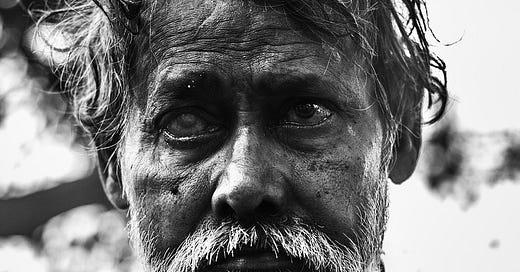Fatherhood dismantles a man’s self-centered foundations
A shepherd father is, by design, one with authority over many
Paul’s preaching today (1 COR 4:6-15) describes the outlandish character changes pastors must adopt to be examples and witnesses to Christ. A holy people need holy witnesses, mentors, and teachers. Due to the nature of a parent’s role, an authority often over many children, the life of someone so chosen means burden over beneficence.
Paul doesn’t frame his example until the end of this passage. He describes the woeful life of a father as the awful distinction for those who testify and pastor.
It’s an unspoken truth. Fatherhood dismantles a man’s self-centered foundations, replacing all self-goals (self-esteem, self-confidence, self-respect, and so on) with death, immolation, exhaustion, dismay, and denial. Such is the plight of the man who pastors, testifies, and teaches. He is a father to the people of God. The father, in effect, is neutered in his self. He gives his life to the family or is an unworthy father.
Image by Tamal Mukherjee
Unfortunately, to unwrap his metaphor, I must first address the unwanted elephant in the room — a required delineation between fathers and mothers and Paul’s use of men’s leadership in the Church as unique from women.
Ugh.
This is an aside but an essential one. We’re in a triggered training war where doublespeak plows through our common ground. We must view humanity through a gender equality lens, disallowing differences between men and women in all their natural elements.
As we know, women becoming mothers are similarly ripped from their lives as princesses. Though few women who pine to be single again would couch their previous lives in such a royalty way, in effect, motherhood means being dead on your feet, immolated at every turn, racked with guilt and failure, and starved.
That’s what Paul could be said to be thinking, but no. He spoke about men. I imply the dangers of parenting are dually dangerous just for our present-day narrative nazis. (My apologies) Paul teaches here about a loss of rank and position (see pedophilia and pedastry in the Church as a strictly male offense, for example) as an unfortunate effect of standing for Christ. (For those still stuck on gender equality, nuns have been called penguins for their sacrifice.)
The male/female structure and societal traditions, as Paul knew them, no longer remain concrete. We have moved away from gender compatibility into gender dissolution. It’s not apparent that what Paul speaks for men likely has a counterpart painfulness for women because it’s unnecessary. Everyone knows this to be true.
Thankfully, Paul never dealt with our confused and angry elephants stampeding in almost every arena and wrote for a more black-and-white time. That is, of course, not true at all. The peacockery of the Pharisees, the rueful treatment of the diseased, and the banished widows and unkempt orphans come to mind. Gender confusion among the Roman aristocrats has been well documented. But, the general population didn’t suffer the verbal atrocities of today. Hmm. I could be wrong about that!
Anyway, whether you like our current arrangement of gender confiscation or you do not, men and women still have differing parental roles in the framing that Paul describes. If you cannot agree, then substitute in your mind the language of gender flatness that works for you.
For satirical effect, recognize that the men in Paul’s time wore robes that looked like dresses. They dealt with unruly, tangled hair attended to with expensive options for conditioners. To finish the picture, one scripture scholar concluded that Paul spoke with a lisp, and his voice sounded like that of a young girl. ) Snarky is OK when there’s simply no other direction to take.)
OK.
When Paul noted in verse 15, “Even if you should have countless guides to Christ, yet you do not have many fathers, for I became your father in Christ Jesus through the Gospel,” he highlighted a theme common in Church leadership today: “Then he said to his disciples, “The harvest is plentiful, but the laborers are few.” (Matthew 9:35-38)
The pewed Christian is not immune from the conditions of the leaders of the Church. Paul wasn’t suggesting that only the fellas who were apostles would be destitute and slandered. He lamented that the benefits of hearing the preaching and teaching of men like he and Apollos provided were an enlightening and heartening grace to the followers of Christ that they no longer enjoyed.
His imagery, “To this very hour we go hungry and thirsty, we are poorly clad and roughly treated, we wander about homeless and we toil, working with our own hands,” describes the plight of the father who gives all to his children.
Those in the Christian community weren’t orphans because Paul said they had “countless guides to Christ.” They profited from each other's example—shared resources among siblings.
But the characteristic of a shepherd father is, by design, one with authority over many.
To finish, this weird but telling teaching by Paul is an insight into his salve for the condition of an apostle in pain. This set of verses is a treasure when read without cynicism or gall.
You are already satisfied; you have already grown rich;
you have become kings without us!
Indeed, I wish that you had become kings,
so that we also might become kings with you.
We can read this many ways, but I like it for its prescience of the Kingdom home we are all headed to. From death into life, we go. With deference to how women may be called, I’ll stick with Paul’s likely and God’s certain, inclusive meaning. We will all be kings.





